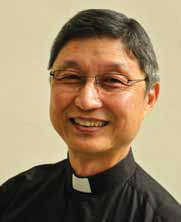 |
||
|
|
|
Events & News Archive
|
The General Secretary's Heartbeat
Presbyterian Polity and Me? In our fast changing society, we need to constantly ask ourselves: "How can the Presbyterians be relevant and effective church in the 21st Century?" As much as the church affirms "Ecclesia reformata, semper reformanda", which means “the church reformed, always reforming”, nevertheless, it is helpful for us to understand the meaning of our Presbyterian Polity. Our Presbyterian Polity is a unique church governance system that balances authority between the Denomination and the Congregation. This system was developed by John Calvin in Geneva and spread by John Knox of Scotland. Scottish immigrants and missionaries from the London Missionary Society brought Presbyterian doctrine and polity to Singapore. The uniqueness about Presbyterian Polity is that authority flows both from the Congregation up and from the Denomination down. Congregational members elect representatives to the Presbyteries. Once elected, the Presbyteries are responsible to exercise authority over the congregations. The Presbyteries are governed by a Synod. The local congregations govern themselves through an elected board called the Session (from the Latin word meaning "to sit"). The Elders or Deacons serve for three years. Each year, one third of the Session members or the Elders and Deacons Court retire and are replaced by members elected by the congregation. This provides stability and continuity in governing the congregation. A senior Minister moderates the Session or the Elders and Deacons Court. Many of the younger generations in our churches may be asking: "What are the essential elements of Presbyterianism that we cannot change if we want to remain Presbyterian?" In other words, at what point of change do we stop being Presbyterian? In answer to this, though our local churches are civil entities as required by the law of the land, the authority of the Church is moral and spiritual, ministerial and declarative. The Presbyterian Church in Singapore (PCS) is spiritually united (not civilly connected) and Presbyterian churches are inter-dependent, not independent. This connectionalism is expressed in our confessional theology, our system of government and discipline, and our cooperative ministry. Our struggles are with those who, as adults, are converted to Presbyterianism and others who may have switched denominational affiliations sometimes more than once. They will likely be the ones who do not have the background of Presbyterian traditions to fall back on. Though theologically, our reformed faith is expressed in our theological convictions that are uniquely Presbyterian, today, in the light of our freedom of conscience, we no longer have theological consensus on some major issues. Theological unity is no longer realistic and as a Synod, we need to review and renew our "Ethos" in order to be relevant for our 21st century. Having served as the English Presbytery Moderator (2002 to 2004) then as the Synod Moderator (2007 to 2009) and as Synod Vice Moderator (2012 to 2014), many have asked why the Presbyterian Moderator is called the "Right Reverend"? In simple terms, the Moderator of the Presbyterian Church in Singapore is the highest office and serves as the ambassador of the denomination both locally and internationally. The "Right Reverend" is the honorific style of recognition of one's service and calling. In the Presbyterian Church in Ireland and Scotland, former Moderators are given the title "Very Reverend" in recognition and appreciation of their contribution to the denomination. In some cases, the denominational Bible schools even confer an honorary Doctoral degree to retired Moderators. The Burning Bush was and still is a popular symbol adopted by the Presbyterians as early as in 1583 by the French Huguenots. The French motto "Flagror non consumer" – I am burned but not consumed – suggests the symbol is understood as that of the suffering church that nevertheless lives.
What is the meaning of the burning bush to each one of us today? What Moses saw in his encounter with God was just an ordinary bush but it became extraordinary because it was on fire yet it was not burned. What is interesting in Exodus 3:1 – 4 is that Moses turned aside to take notice. How often do we "turn aside" to take notice of the ordinary bushes in our lives that can be on fire by and for God? "Reformed and always reforming" in our changing culture means:
Rev Tan Cheng Huat |
|
|
Copyright © 2024 The Presbyterian Church in Singapore. All rights reserved. |
